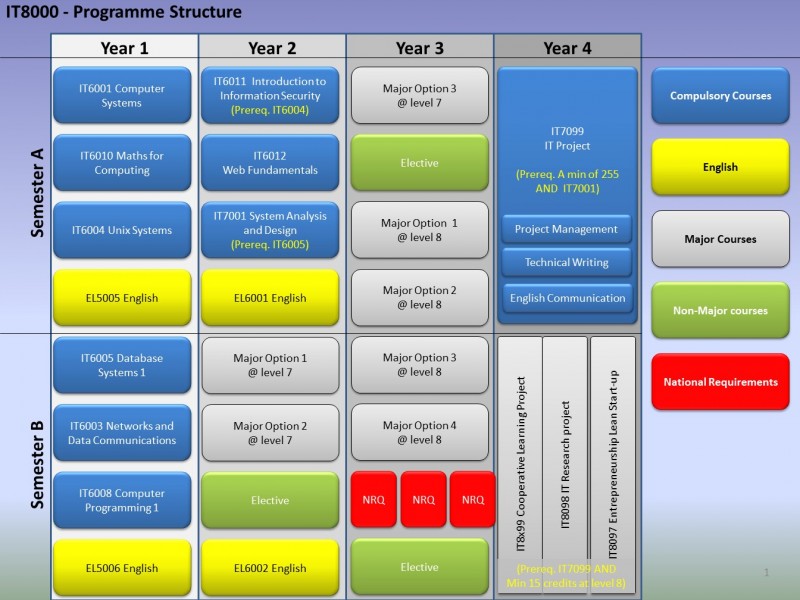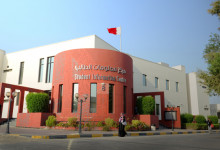 The Information and Communication Technology Innovation Laboratory (ICTIL) was approved by the Bahrain Polytechnic Senior Management Team on the 21st of July 2013. Approval was given for an initial proof of concept with three student projects that were developed to prototype stage by Bachelor of ICT (BICT) students. This page outlines the goals, structure and purpose of the lab and how it fits into the overall entrepreneurial and innovation promotion ethos within the institute.
The Information and Communication Technology Innovation Laboratory (ICTIL) was approved by the Bahrain Polytechnic Senior Management Team on the 21st of July 2013. Approval was given for an initial proof of concept with three student projects that were developed to prototype stage by Bachelor of ICT (BICT) students. This page outlines the goals, structure and purpose of the lab and how it fits into the overall entrepreneurial and innovation promotion ethos within the institute.
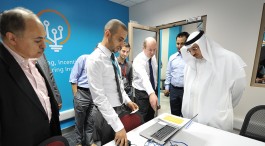 In the initial stages of the ICTIL, the focus will be on web-based software applications, accessed through a web browser in a similar manner to Self Service Banner or Moodle. The ease with which such applications can be designed and developed, along with the relatively low cost of implementation and support, ensures that quality software can be created and delivered within one academic semester. It is hoped that in the future other types of projects, including hardware or networking projects, could be implemented at the ICTIL.
In the initial stages of the ICTIL, the focus will be on web-based software applications, accessed through a web browser in a similar manner to Self Service Banner or Moodle. The ease with which such applications can be designed and developed, along with the relatively low cost of implementation and support, ensures that quality software can be created and delivered within one academic semester. It is hoped that in the future other types of projects, including hardware or networking projects, could be implemented at the ICTIL.
By facilitating student projects, the ICTIL will develop students with a sense of professionalism, an awareness of industry norms and further develop employability skills in addition to what the students have previously learned in the Bachelor of ICT Programme. Students undertaking such projects will be expected to behave as if they were employees of the ICTIL, attending during the core working hours as determined by the institute. Students will not be paid for their time working in the ICTIL.
Objectives
The institutional definition of a polytechnic is “a higher education institution that offers career focused programmes, to produce professional and enterprising work-ready, graduates”. The ICT Innovation Lab (ICTIL) adheres to this definition by facilitating innovation arising out of student work in the Bachelor of ICT Programme.
The objectives of the ICT Innovation Lab are to:
- Facilitate ICT student innovation by providing the resources necessary to develop projects from prototype stage to market readiness
- Facilitate a multi-disciplinary approach by engaging with other schools within the institute that can provide ancillary support to ICT projects
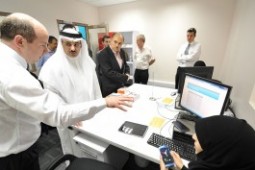 The ICTIL will facilitate student innovation by encouraging students to come up with ICT projects that solve every day problems. Initially, the focus will be software projects, however in time it is envisaged that the scope of the projects will broaden to encompass both hardware and software. Students will also be offered the opportunity to work on projects suggested by staff members, both academic and non-academic. Structures will be put in place to ensure that projects are supported through project management techniques and effective mentoring. Support services, such as ICT are critical to the success of the ICTIL.
The ICTIL will facilitate student innovation by encouraging students to come up with ICT projects that solve every day problems. Initially, the focus will be software projects, however in time it is envisaged that the scope of the projects will broaden to encompass both hardware and software. Students will also be offered the opportunity to work on projects suggested by staff members, both academic and non-academic. Structures will be put in place to ensure that projects are supported through project management techniques and effective mentoring. Support services, such as ICT are critical to the success of the ICTIL.
The mission of Bahrain Polytechnic is to produce “professional and enterprising graduates with the 21st Century skills necessary for the needs of the community locally, regionally and internationally”. By facilitating student projects, the ICTIL will develop students with a sense of professionalism, an awareness of industry norms and further develop employability skills in addition to what the students have previously learned in the Bachelor of ICT Programme. Students undertaking such projects will be expected to behave as if they were employees of the ICTIL, attending during the core working hours as determined by the institute. Students will not be paid for their time working in the ICITIL.
Three of the core values of Bahrain Polytechnic are excellence, learning and innovation. The ICTIL will adhere to these values by:
- Ensuring excellence by utilising industry best practice at all stages of the delivery of projects
- Learning will be encouraged by challenging students to consider alternative technologies to what they have previously used, determining requirements not based on personal preferences, but on client need
- Innovation is nurtured through course work, project work and team work
Core Principles of the ICT Innovation Lab
- Facilitating innovation
- Incentivising innovation
- Delivering innovation
The interaction is outlined below
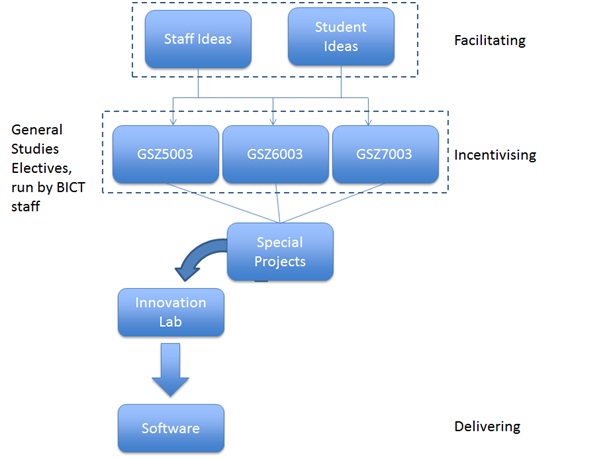
- FACILITATING INNOVATION
In order to facilitate innovation, students are encouraged to propose projects regardless of what stage they are at in the BICT programme. If a proposal is accepted, students may apply to work on the project in the ICTIL and receive credits towards their degree.
- INCENTIVISING INNOVATION
To incentivise innovation for non-Year 4 students, an initiative is underway to create two ICT Special Projects electives in addition to the Level 5 Special Projects elective that are currently in place. By evaluating the level and complexity of a project proposal, it can be assigned an appropriate level elective, thereby providing an incentive for students to propose and undertake such projects.
- DELIVERING INNOVATION
By putting in place a range of support structures, including mentoring, technology and physical environment, it is hoped that the combination of these three factors will result in the delivery of quality software products that will fulfil a need in a range of markets. Projects will adhere to industry standards and best practice.
Projects Pipeline
In Year 4, Semester A of the Bachelor of ICT programme, ICT students undertake a 60 credit, semester-long project as part of their studies. Following this project, students will then undertake a 60 credit, semester long cooperative learning project (CLP) at an organisation external to Bahrain Polytechnic.
Projects delivered in the Year 4, semester A module will be assessed for their commercial potential by a committee. Once these projects have been identified, students will be invited to undertake their cooperative learning project in the ICTIL. As different cohorts of students progress through the programme, each semester will provide a number of projects to be assessed for commercial potential, thereby maintaining the viability of the ICTIL. This “pipeline” concept is outlined below
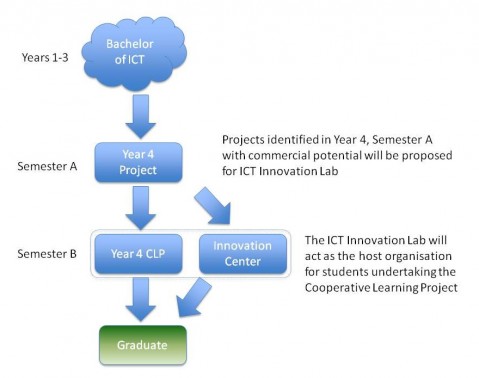
Project Pipeline
Students undertaking their cooperative learning project in the ICTIL will be treated no differently to students undertaking the CLP in an external organisation. They will be expected to meet the key deliverables of the CLP in addition to the deliverables agreed with the ICTIL project. As the CLP is of one semester in duration, any project accepted for the ICTIL must be capable of being developed within this timeframe. However, later in this document additional time for implementation and support is discussed.
Facilitating, Incentivising and Delivering Innovation
In addition to accepting students who have completed the Year 4, semester A project, it is hoped that the ICTIL will also facilitate students with project ideas in Years 1, 2 and 3 of the BICT programme. Students can take a Level 5, Level 6 or Level 7 Special Projects elective, depending on the nature and complexity of the project.
These special projects will also be facilitated in the ICTIL on a part-time basis, similar in terms of deliverables and contact hours as any elective course. The interaction with the ICTIL is shown below.
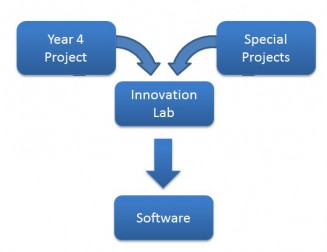
ICT Innovation lab with special projects
As with any elective course, once students meet the requirements and the learning outcomes, they will be awarded 15 credits towards their programme requirements.


